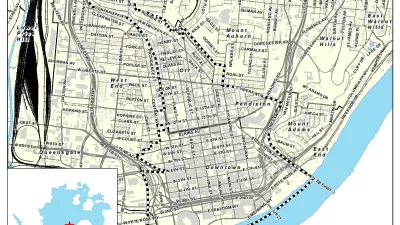A vote by the city of Cincinnati's Historic Conservation Board, of all things, would prioritize parking over historic integrity.
"An Over-the-Rhine development has hit a potential challenge after a 3-3 vote at last month’s Historic Conservation Board meeting," reports John Yung.
The development in question would convert the historic Strietmann Biscuit Company building into a 88,000-square-foot office building. The challenge: the developers "must now request a zone change since it does not meeting the city’s mandatory minimum parking requirements," according to Yung.
The implications of the example are strange, indeed. According to Yung, "the vote from the Historic Conservation Board actually threatens the historic nature of the building and the surrounding neighborhood, as providing the parking being requested would necessitate that a portion of the building be converted to parking, or a nearby historic structure be demolished to make room for a parking structure."
Yung provides more details on the development proposal, noting that it is ripe for a more progressive approach to parking minimums: "the 126-year-old structure is located within a short walk to numerous Red Bike and Cincinnati Streetcar stations; and the location’s Walk Score is 94 out of 100 points."
Hat tip t Angie Schmitt for sharing the story.
FULL STORY: Cincinnati’s Mandatory Minimum Parking Requirements Stall $15M Development

Maui's Vacation Rental Debate Turns Ugly
Verbal attacks, misinformation campaigns and fistfights plague a high-stakes debate to convert thousands of vacation rentals into long-term housing.

Planetizen Federal Action Tracker
A weekly monitor of how Trump’s orders and actions are impacting planners and planning in America.

In Urban Planning, AI Prompting Could be the New Design Thinking
Creativity has long been key to great urban design. What if we see AI as our new creative partner?

King County Supportive Housing Program Offers Hope for Unhoused Residents
The county is taking a ‘Housing First’ approach that prioritizes getting people into housing, then offering wraparound supportive services.

Researchers Use AI to Get Clearer Picture of US Housing
Analysts are using artificial intelligence to supercharge their research by allowing them to comb through data faster. Though these AI tools can be error prone, they save time and housing researchers are optimistic about the future.

Making Shared Micromobility More Inclusive
Cities and shared mobility system operators can do more to include people with disabilities in planning and operations, per a new report.
Urban Design for Planners 1: Software Tools
This six-course series explores essential urban design concepts using open source software and equips planners with the tools they need to participate fully in the urban design process.
Planning for Universal Design
Learn the tools for implementing Universal Design in planning regulations.
planning NEXT
Appalachian Highlands Housing Partners
Mpact (founded as Rail~Volution)
City of Camden Redevelopment Agency
City of Astoria
City of Portland
City of Laramie




























